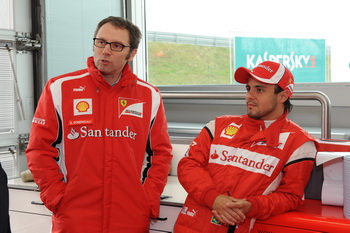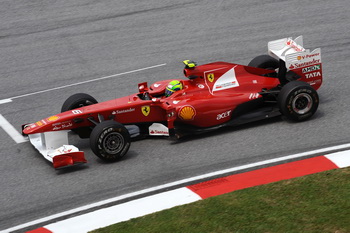
 |
|
"Back at the factory we have to have a big
push to understand our lack of performance,”
says Ferrari Team Principal Stefano
Domenicali (top left with Felipe Massa
during the Ferrari 150º Italia's shakedown runs at Fiorano),
"We need to push a lot to upgrade our aero
package because aerodynamics is the key to
it all." Photo bottom: Massa on his way to
fifth place in last weekend's Malaysian
Grand Prix. |
|
|
|
The first long-haul stint
on the F1 calendar concludes this coming Sunday with the
eighth running of the Chinese Grand Prix at the vast and
modern Shanghai International Circuit. After this, the
teams will return to their European bases and have the
first real opportunity to assess what has happened so
far over three races, given that there will then be a
three week break until the team trucks and motorhomes
make their seasonal debut in Istanbul. However,
development work continues virtually 24-7 and after two
less than satisfactory performances in Australia and
Malaysia for Scuderia Ferrari, its team
principal, Stefano Domenicali, technical director Aldo
Costa and his deputy Pat Fry, chose to return to
Maranello as soon as the sound of the engines had died
in Sepang in order to be involved first hand in speeding
up the development process of the 150º Italia.
The difficulties the team face with this year’s car
might sound familiar to anyone who followed the Prancing
Horse in 2010: a good race pace on Sunday, but
difficulties one day before in qualifying. However, to
keep a sense of perspective, there have only been two
races run so far and, if one removes the clearly
faultless Vettel from the equation - the reigning world
champion absolutely on top form at the moment - then the
Scuderia’s performance looks more respectable. While the
word “if” should maybe not be used in sport, it is also
true that if Felipe Massa had not had a problem at his
first pit stop in Malaysia and if Fernando’s failed rear
wing had not forced him into an error that led to him
having to pit for a new nose, then both Maranello men
could legitimately claim to be heading for the podium.
“The main problem we need to deal with is our
performance the day before the race in qualifying which
is not at the same level as the teams that are currently
best,” said Domenicali. “It is vital for us to react
immediately, because we have seen how rapidly things can
change in Formula 1. In terms of strategy we can say our
race in Sepang was a good one, because our choices
proved to be the right ones and the fact we were unable
to bring home more points was down to other causes. So
strategy and race performance are two positive factors.”
Domenicali was also happy with his two drivers: “Felipe
drove to a very high standard, showing a return to form
and Fernando was very aggressive, which is always good
for a driver” he said.
“Back at the factory we have to have a big push to
understand our lack of performance,” said the team
principal. “We need to push a lot to upgrade our aero
package because aerodynamics is the key to it all. We
will try and bring as quickly as possible the upgrades,
maybe already in China, that we require. We need to
understand as soon as possible why the performance on
track has not matched the figures coming out of the wind
tunnel. If we have not a clear picture, then we need to
change the direction of the work we are doing in terms
of development. The other important factor is to keep on
increasing our understanding of how to use the tyres,
because we saw in Malaysia that this is another area
that makes a difference. As for KERS, I cannot talk
about it in general, but certainly for us it is a useful
aid in terms of boosting car performance. Then, when it
comes to the race, it can be used either to attack
another driver or to defend your own position. Therefore
it is an interesting addition to the sport.”
In Melbourne, mainly due to colder conditions than
expected, the predicted high number of pit stops did not
materialise, but they did in Malaysia, with a total of
59 visits recorded down pit lane, although this includes
some drivers pitting with mechanical problems or to take
a penalty. Therefore, Domenicali feels that apart from
the technical package, team work is another area that
needs analysing and improving. “The trend for more tyre
changes means our pit stop crew guys are always under
pressure, so the chance of making mistakes is higher. If
Formula 1 has always been a case of having a package
made up of the driver and the team, then that is even
more the case now requiring a different approach to the
races.”
Scuderia Ferrari can look to this weekend knowing it is
on familiar terms with the Shanghai podium, having won
three of the seven races held here: in 2004 with Rubens
Barrichello, two years later thanks to Michael
Schumacher and in 2007 with Kimi Raikkonen. Of our
current drivers, Fernando won in 2005 and Felipe’s best
results have been a second and a third place. The
country is also commercially significant for the
Prancing Horse: “China is an ever more important country
for Ferrari, because the market here continues to grow,
as does the appreciation of our products,” commented
Domenicali. “It is a strategically very important market
for us, growing at an incredible rate. All these reasons
make this an important event for us this weekend."
|
|
|